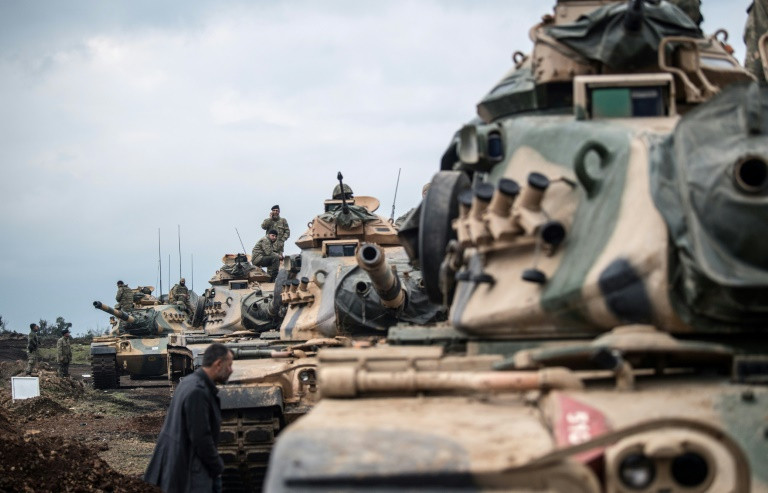
Turkey on Monday shelled Kurdish militia targets in Syria and claimed progress in a cross-border offensive that has stoked concern among its allies and neighbours.
The Turkish military on Saturday launched operation “Olive Branch”, its second major incursion into Syrian territory during the seven-year civil war.
The operation, where Turkish war planes and artillery are backing a major ground incursion launched with Ankara-backed Syrian rebels and Turkish tanks, aims to oust the People’s Protection Units (YPG) militia from its enclave of Afrin.
Turkey considers the YPG to be a terror group and the Syrian offshoot of the Kurdistan Workers’ Party (PKK) which has waged a bloody three-decade insurgency against the Turkish state.
But the operation is hugely sensitive as Washington relied on the YPG to oust Islamic State (IS) jihadists from their Syrian strongholds and the Kurdish militia now holds much of Syria’s north.
France has called for a UN Security Council meeting Monday to discuss concerns over flashpoint areas in Syria including the Turkish offensive.
– ‘A short operation’ –
Turkish television quoted military sources as saying the ground forces had already taken 11 villages in their advance into Syria.
“The cleaning up is taking place step-by-step,” was the headline in the pro-government Yeni Safak daily.
Meanwhile, Turkish artillery were firing shells on YPG targets inside Syria on the third day of the offensive.
The Britain-based Syrian Observatory for Human Rights said a total of 21 civilians — including six children — had been killed in the operation.
But Ankara has denied inflicting civilian casualties, with Foreign Minister Mevlut Cavusoglu accusing the YPG of sending out “nonsense propaganda and baseless lies”.
The YPG also said it had been preventing the Turkish advance with fierce resistance but this has not been confirmed by Ankara.
“God willing, this operation will be finished in a very short time,” President Recep Tayyip Erdogan told supporters Sunday. “We will not take a step back.”
Deputy Prime Minister Mehmet Simsek said the operation would be short and would not have a negative effect on the economy.
“Investors should be calm,” he said. “This will be an effective, and limited operation and, God willing, it will be short.”
In a sign of the risks to Turkey, 11 rockets fired from Syria hit the Turkish border town of Reyhanli Sunday, killing one Syrian refugee and wounding 46 people, 16 of them Syrian, the local governor said.
The operation is Turkey’s second major incursion into Syria during the seven-year civil war after the August 2016-March 2017 Euphrates Shield campaign in an area to the east of Afrin, against both the YPG and IS.
– US urges restraint –
But as well as a complex military task, Turkey has to wage a sensitive diplomatic campaign to avoid alienating allies and provoking foes.
Western capitals are particularly concerned that the campaign against the YPG will take the focus away from eliminating IS after a string of successes in recent months.
In its first reaction, the US State Department urged Turkey “to exercise restraint” and ensure the operation remained “limited in scope”.
Defence Secretary Jim Mattis said Turkey had been “candid” and had provided Washington with advance warning of its operation.
Meanwhile Russia and Iran — who have a military presence in Syria and are working with Turkey on a peace process — have also expressed concern.
The Iranian foreign ministry said Tehran was closely watching the operation and expressed hope it would end immediately “so as to prevent the deepening of the crisis in northern Syria.”
The Russian foreign ministry voiced concern and urged Turkey to show restraint, while the defence ministry said its troops were withdrawing from the Afrin area to ensure their security and prevent any “provocation”.
– ‘Pay the price’ –
Erdogan has urged national solidarity over the operation and the government has reached out to leaders of the main nationalist and secular opposition parties.
But Erdogan warned those who respond to calls by the pro-Kurdish Peoples’ Democratic Party (HDP) for protests will have to pay a “heavy price”.
The authorities on Monday detained 24 people on suspicion of disseminating “terror propaganda” in favour of the YPG and against the operation on social media.
Turkish anti-riot police on Sunday blocked protests in Istanbul and in Diyarbakir against the Syria offensive.



